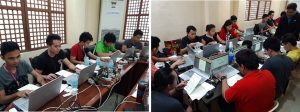DSWD aims for effective data management to ensure aid to all families displaced by Naga City landslide
News October 3, 2018, 0 Comment 0
DSWD Field Office VII staff and some volunteers work together to encode the entries of the Disaster Assistance Family Access Card (DAFAC) of families displaced by the landslide incident in Naga City, Cebu. This will ensure the effective delivery of assistance to all affected families.
To monitor the provision of aid and to ensure that all affected families are given appropriate assistance, the Department of Social Welfare and Development (DSWD) has started to encode the entries of the Disaster Assistance Family Access Card (DAFAC) of families displaced by the landslide incident in Naga City, Cebu.
DAFAC plays an important role in monitoring the provision of assistance to families affected by disasters. It is the system used by the DSWD to validate the status of the affected families and serves as a reference for the provision of additional and appropriate interventions to them.
The family access card records the names of the members of each displaced family, including where they are currently staying at, and keeps track of the assistance that has been extended to them.
With the help of some volunteers, DSWD Field Office (FO) in Region VII has started to encode the DAFAC entries of the evacuees on September 28. The FO expects to finish encoding the information within the week.
“Effective data management is important in the delivery of services to our IDPs. This is why we need to fast track the encoding of the information of the families gathered through the DAFAC,” DSWD FO VII Regional Director Ma. Evelyn Macapobre said.
The Director said that the encoded entries will be reviewed to come up with a clean master list of the displaced families, which will be the basis of providing further interventions to the IDPs.
As of October 2, some 1,947 families or 7,863 individuals have been displaced by the landslide incident in Naga City. They are all currently staying in the 11 established evacuation centers (ECs); 10 of which are located in the city, while the remaining EC is located in the Municipality of San Fernando.
The DSWD, through Field Office VII, has provided a total of P 5,237,204.28 worth of assistance to the IDPs. This includes P1,736,640 worth of family food packs, P3,225,564.28 worth of non-food items, and P 275,000 cash assistance extended to the bereaved families.
“Data management is very crucial during disasters, as we need to ensure that all affected families and individuals are provided with much-needed aid from the Department. We thank those who volunteered their time and energy to help our FO VII encode the data of our evacuees,” DSWD Secretary Virginia N. Orogo said.
“The DSWD remains on top in camp coordination and camp management as well as in providing protection to the IDPs inside the evacuation centers. We also ensure the continuous provision of food and non-food items to the evacuees. We will continue to assist them until they have been relocated to a safer place,” the Secretary added. ###